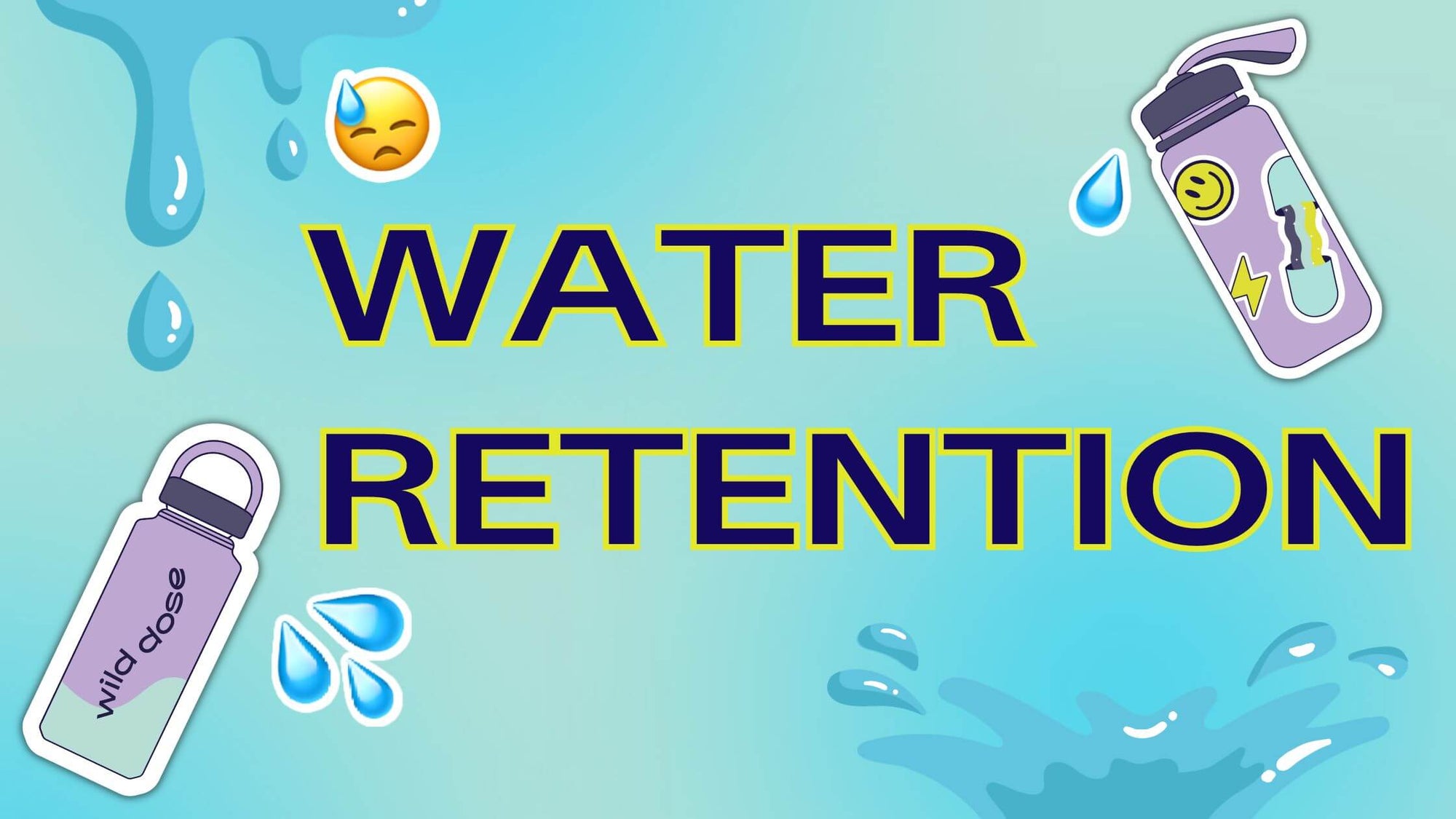Why Does Constipation Occur?
Constipation. You've probably experienced it at least a handful of times in your life. Some of you may get constipated more often than you’d like to think about or admit. While constipation might be a little embarrassing or uncomfortable to talk about, we’re here to break that barrier and make speaking up about this bowel issue normal!
If you’re the latter and you’re dealing with constipation regularly, which can be annoying and even painful to deal with, you’ve come to the right place. In this article, we will cover everything you need to know about constipation. We will start by covering what it is, what causes it, and how to identify it, and then we’ll follow up with some top tips on how to prevent or relieve constipation naturally.
What is Constipation?
Constipation is a digestive issue that almost one in every five people experience on a regular basis. It comes along with feelings of fullness and tightness in the abdomen, and can often also be associated with cramping, bloating, and pain.
Although constipation can affect anybody, at any time and any age, it impacts some people more than others. For a portion of the population, constipation is a digestive problem that negatively impacts their daily lives.
Missing a single bowel movement because you've got a hectic schedule one day doesn't count as constipation (even though it might feel like you're constipated by the end of the day)! In order for you to officially be constipated, you will need to have had less than three toilet trips over the course of a full week (so, a bowel movement less than once every two days).
Constipation can lead to hard stools that are tough or painful to pass. Sometimes, you might feel like you want to go to the toilet, but nothing comes out when you sit on the toilet seat, no matter how hard you push. Straining can lead to further pains and cramps that make your constipation even harder to cope with.
What Causes Constipation?
There are lots of things that can cause constipation (annoyingly!), some of which are more common than others.
Ultimately, constipation results from things that cause your digestion to slow down and food to remain in your colon for longer than necessary. When food sits in your digestive tract for a while, your body draws water from it, causing it to become harder.
But what causes food to halt in your colon instead of smoothly passing down the rest of your lower digestive tract and into the toilet bowl? Here are some of the most common causes of constipation.
1. Changes in your diet
Your body likes things to stay the same, and that includes your diet. It will respond if you make drastic changes to your diet, and one of the main ways it’ll show its disdain is by slowing your digestion and causing a blockage.
In particular, changing to a diet that is higher in salt, sugar, and saturated fats or lower in fibre can carry a higher risk of constipation. If you want to make changes to your diet, do so slowly. Try to limit your intake of fast foods or processed foods and maximise your fibre and nutrient intake.
2. Interruptions in your schedule
Again, your body wants normality. It wants things to remain the same, day in and day out. This doesn’t just apply to your diet. It’s also relevant to your daily schedule.
Whether you usually head to the toilet as soon as you wake up, just before lunch, or just before you go to bed, you might become constipated if your usual schedule changes for several days. Your digestion might slow down, and your diet might be a little off when you’re busier than usual or not in the comfort of your own home, such as if you’re on a long holiday.
3. Not drinking enough water
Staying hydrated is essential for healthy digestion (and just a healthy body overall). If you forget to properly hydrate yourself throughout the day, you’ll start feeling thirsty and fatigued. If this continues for a few days, you could end up bloated and constipated.
4. Chronic digestive condition
You might have a chronic lack of toilet regularity if you’re suffering from a long-term digestive issue. For example, if you have irritable bowel syndrome (IBS), inflammatory bowel disease (IBD), or gastroparesis, you’re sadly more prone to getting constipated.
Managing your condition properly with the help of a doctor and registered dietician is essential to keep your digestive symptoms and abdominal comfort to a minimum.
5. Menstrual cycle
Hormones can have significant impacts on your digestion, meaning the different stages of your menstrual cycle can impact your gut (mostly due to the natural fluctuations in the reproductive hormones, oestrogen and progesterone).
In particular, progesterone, a hormone that increases in the latter end of your cycle (a week or two before your period) causes the muscles in your digestive system to relax. As a result, these muscles become a little lazier and don’t work as hard to push food through your colon and into the toilet bowl. The result? Constipation and bloating!
6. Certain medications
Certain medications, such as anti-hypertensives, antacids, antidepressant medications, and narcotics, are known to impact digestion. These medications can interfere with your normal digestive processes and cause food to remain stagnant in your colon for longer than it usually would, leading to negative digestive symptoms like bloating, cramping, and constipation.
How to Know if I'm Constipated?
Constipation is a well-known problem, and most of you reading this will probably have a good idea of what it feels like. However, it can sometimes be difficult to distinguish between bloating and constipation since the latter can vary in severity and cause.
Here are some of the key criteria that confirm constipation:
- Infrequent bowel movements (three movements a week or fewer)
- Excessive straining to pass stools, possibly associated with pain
- Hard or lumpy stools
- Feeling backed up and as though there is a blockage in your lower digestive tract
- Changes to your appetite due to feelings of fullness or nausea
How Can I Prevent Constipation?
If you’re someone who frequently gets constipated and struggles with maintaining bowel regularity, you’ll be glad to know that there are things you can do to prevent or relieve constipation naturally. Here are some helpful things to try.
1. Invest in a top-quality probiotic
Probiotic supplements are well-loved and well-researched. They contain millions of colonies of beneficial bacteria, such as Bifidobacterium and Lactobacillus. These bacterial species are found naturally in the colon (alongside billions of other microorganisms) but you can take a probiotic supplement to support your natural gut microbiome.
If you’re constipated, it could be due to gut dysbiosis, which describes when your gut microbiome becomes unbalanced. You can get gut dysbiosis because of a number of different things, such as poor diet, infections, and digestive illnesses, and it can lead to bloating, abdominal cramping, and...you guessed it... constipation.
Taking regular probiotics can help to keep things in check down in your colon. Our probiotic supplement, A Dose For Bloating, is the answer to your prayers if you suffer from a lack of regularity. It contains two billion probiotics, seven digestive enzymes, and seven plant extracts to boost your digestive health and keep constipation at bay.
2. Make sure to eat plenty of fibre
Fibre is essential for keeping things moving in your colon. It’s a type of carbohydrate that your body (or gut bugs, should we say) can’t fully break down, so it passes all the way through your digestive tract, undigested or partially digested.
Consuming more fibre in your diet can support a healthy gut microbiome, improve immunity, and lower the risk of constipation. High-fibre foods include whole grains (oats, pasta, rice, and bread), potatoes, fruits, and vegetables.
3. Keep yourself hydrated
Inadequate fluid intake is one of the most common (but easiest to resolve) causes of constipation. If your body is dehydrated, it will pull more water from your stools, causing the stools to become harder. A harder stool won’t pass as easily out of your digestive tract, potentially causing you to become constipated (or, at the very least, to have an unenjoyable and painful toilet trip).
The simple solution to this problem is to drink more water. Consume water regularly throughout the day and limit your intake of natural diuretics, such as caffeine and alcohol.
4. Drink more coffee
Okay, we’ve just said to limit your intake of caffeine, but there’s a caveat. Coffee, although caffeine-containing, can actually be helpful if you’re constipated. As long as you’re drinking enough water to avoid dehydration, adding some coffee into your diet can reduce the risk and severity of constipation.
Coffee can stimulate the muscles of the digestive tract, encouraging food to get moving. Note that if you have irritable bowel syndrome, you might be a little more sensitive to caffeine than the average person, so keep note of how caffeinated coffee makes you feel and adjust your intake accordingly.
5. Take a herbal laxative
There are a few reliable herbal laxatives available over the counter nowadays, and they can be helpful for relieving constipation, whether it's caused by stress, changes in your schedule, dehydration, or a gastrointestinal condition.
You can take laxatives orally (by swallowing them) or rectally (by inserting them into your rectum). Both options are effective, but you might have a preference for one or the other. Natural laxatives contain compounds from plants that help to stimulate the nerves in the gut, causing food to pass through your colon more easily.
We recommend checking with your doctor or a dietician to double-check that you're able to take a natural laxative supplement safely. Some people might be better off avoiding them, such as if you're pregnant, breastfeeding, or have a chronic digestive health issue.
You can also consume foods that have a natural laxative effect by relaxing the muscles in the lower digestive tract. These foods include apples, citrus fruits, kiwis, pears, Brussels sprouts, spinach, chia seeds, and flax seeds.
Got questions about our supplement, A Dose For Bloating? Get in touch!









